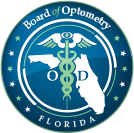The 2013 legislative session brought very important changes for the practice of optometry. On April 19, 2013, Governor Rick Scott signed HB-239 into law, which significantly increased the scope of practice of optometry. The law now includes prescription authority for certain certified optometrists.
Any certified optometrist that completes a 20 hour course and passes a subsequent examination on general and ocular pharmaceutical agents and their side effects may prescribe certain oral drugs to treat injuries and diseases of the eye. To register for the course and examination, please visit http://optometristonlinece.com for additional information. Specifically, a certified optometrist who completes the course and passes the examination mentioned above may administer or prescribe the following drugs or their generic equivalents:
- Tramadol hydrochloride
- Acetaminophen 300 mg with No. 3 codeine phosphate 30 mg
- Amoxicillin with or without clavulanic acid.
- Azithromycin
- Erythromycin
- Dicloxacillin
- Doxycycline/Tetracycline
- Keflex
- Minocycline
- Acyclovir
- Famciclovir
- Valacyclovir
- Acetazolamide
- Methazolamide
However, certified optometrists may not provide a prescription for more than a 72 hour supply of tramadol hydrochloride, acetaminophen 300 mg with no. 3 codeine phosphate 30 mg, acetazolamide, or methazolamide without consulting a licensed medical or osteopathic physician.
Certified optometrists are strictly prohibited from administering or prescribing any controlled substances that are not specifically listed above. Moreover, certified optometrists may not administer or prescribe any controlled substance for the treatment of chronic nonmalignant pain as defined in Section 456.44(1)(e), Florida Statutes. Additionally, certified optometrists are prohibited from prescribing, ordering, dispensing, administering, selling, or giving any drug for the purpose of treating a systemic disease. However, the law provides a single exception, which allows certified optometrist to utilize commonly accepted means and methods to immediately address anaphylaxis.
Once the course has been taken and the examination has been passed, a certified optometrist must register with the DEA for the purpose of prescribing the controlled substances listed above. Additionally, certified optometrists have been added to the list of health care practitioners that may access the Prescription Drug Monitoring Program (PDMP) when prescribing controlled substances.





